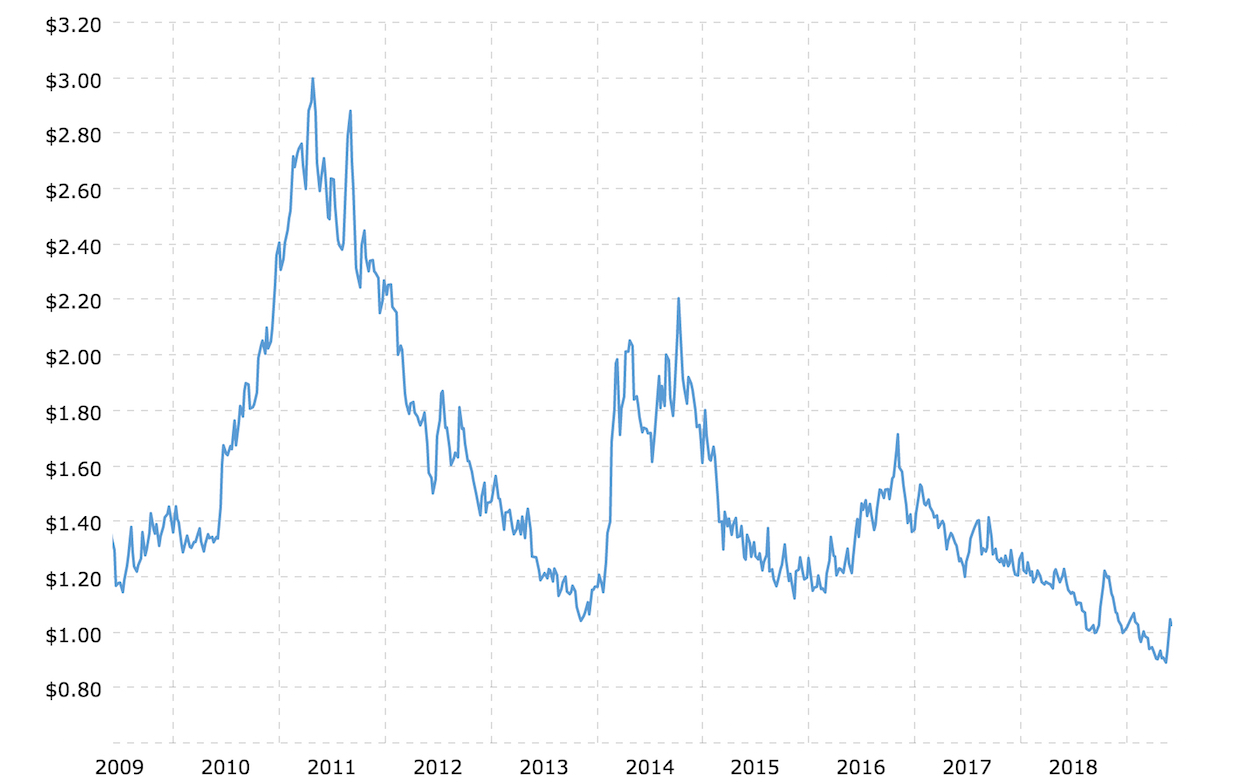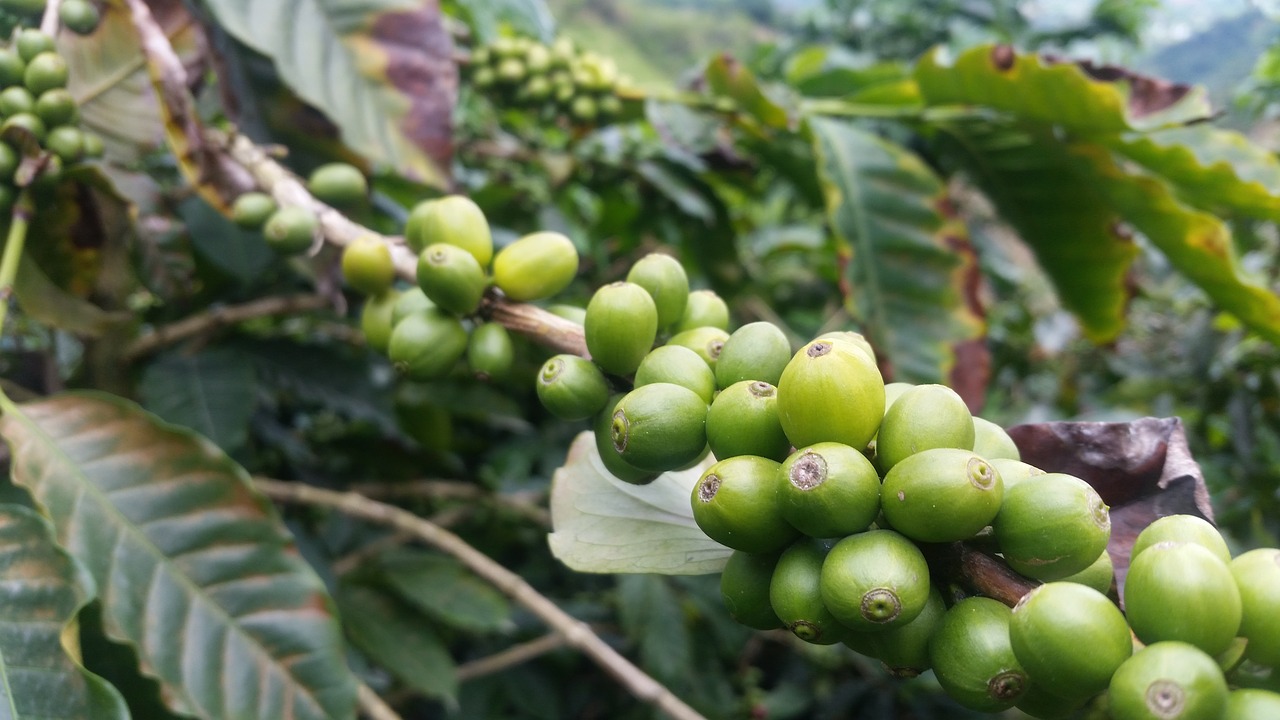
The 10-year chart of coffee prices. Image courtesy of Macrotrends.
Within the latest call to action to address the lingering coffee price crisis, the Germany-based, sustainability-focused nonprofit Global Coffee Platform has asked coffee buyers to consider fundamentally revising their approach to futures contracts in the commodities market.
Published in conjunction with the World of Coffee Expo taking place this week in Berlin, the call to action led with a plea to “industry stakeholders” — i.e. traders and end-buyers of green coffee (roasters) — to engage with international commodity exchanges to “enhance the coffee futures contracts (Arabica and Robusta) as genuine and effective price discovery tools to service producers, exporters, traders, roasters, and retailers.”
It’s a big ask, considering those very stakeholders are the ones who stand to profit most when prices collapse, as they have every few years in the unregulated era of the global coffee trade.
The call to action further states that such such engagement should include “the regulation of high frequency, artificial intelligence, and algorithmic (black box) trade participation to minimize excessive speculative participation.”
As of this writing, the July futures price for coffee on the International Commodities Exchange was sitting at $1.0205 per pound. In early May, that price was down to $0.8665 per pound, representing the lowest “C price” for coffee since 2004. By no estimates are those price examples — even if bulked up by common contracted premiums — able to cover most farmers’ costs of production.
In yesterday’s announcement, the 140+ member Global Coffee Platform stated, “current and persistent low international coffee prices have caused severe damages to the viability of sustainable coffee production and are harming coffee farming families. Given our serious concern, the GCP calls for urgent global collective action to overcome this crisis which is threatening the lives of millions of smallholder coffee farmers, the environment and the coffee industry itself.”
The group has joined a chorus of other sustainability-focused organizations, producer representatives, trade associations and other NGOs in calling for immediate and collective action regarding the price crisis. A consortium of some of the world’s leading producer groups aptly described the current price situation as a “humanitarian crisis,” in that large numbers of farmers are facing crippling poverty and being forced to abandon coffee in favor of illicit crops, or migrating in search of better opportunities.
Buyers sprinkled throughout the specialty coffee sector have been highly engaged in the price conversation, launching alternative price discovery tools, setting minimum price floors, committing to long-term relationships with producers, taking a holistic approach to supply chain sustainability, and much more. Yet big-name global buyers in the United States, European and Asian markets — those to whom this GCP call to action seems most squarely addressed — have largely maintained their silence, building profit as lower C prices have not been translated to lower prices to consumers.
Here is the GCP’s call to action in full:
The Global Coffee Platform (GCP) believes that the economic viability of coffee farming is key to ensuring sustainable livelihoods in coffee producing communities throughout the world. However, current and persistent low international coffee prices have caused severe damages to the viability of sustainable coffee production and are harming coffee farming families.
Given our serious concern, the GCP calls for urgent global collective action to overcome this crisis which is threatening the lives of millions of smallholder coffee farmers, the environment and the coffee industry itself.
Through GCP’s partnership with the International Coffee Organization (ICO), in support of ICO Resolution 465, and with reference to the World Coffee Producers Forum (WCPF), we acknowledge that the entire global coffee sector bears responsibility to foster the path towards a reasonable living income for coffee producers, and to help ensure the economic viability of coffee farming worldwide.
Therefore, the Global Coffee Platform calls on all coffee industry stakeholders and partners to take the following actions:
- Engage with the international coffee exchanges (US and EU) to:
- Enhance the coffee futures contracts (Arabica and Robusta) as genuine and effective price discovery tools to service producers, exporters, traders, roasters, and retailers; This includes the regulation of high frequency, artificial intelligence, and algorithmic (black box) trade participation to minimize excessive speculative participation
- Encourage roasters and retailers to:
- Make forward looking and increasing commitments about sourcing sustainable coffee [i] with remunerative prices that allow for investments into sustainable coffee production
- Transparently report volumes of sustainable coffee purchased by origin on an annual basis to encourage diversity of sourcing
- Promote consumption of sustainable coffee both in coffee importing markets and coffee producing countries
- Enlarge the scope of sustainable coffee, enabling greater participation of smallholder farmers to manage their farms as businesses
- Activate stakeholders in producing countries – governments, producers, businesses, and donors – to:
- Foster the improvement of a conducive business environment for sustainable coffee production through public-private country platforms
- Reduce inefficiencies and increase transparency along the supply chain to ensure that the farmer receives a higher percentage of the price
- Promote hedging strategies and insurance schemes through producer organizations in order to protect coffee growers’ margins
- Encourage income diversification for smallholder coffee farmers in collaboration with governments, private sector, donors, NGOs
- Mobilize governmental agencies, the private sector, and civil society to:
- Achieve policy changes that enable a living income and the economic viability of coffee farming
- Explore practical ways to channel revenues from taxes generated specifically by coffee (excise, specific, tariffs, etc.) directly to coffee farmers to pay for good environmental practices, achieve optimum productivity, and reduce costs
- Design innovative solutions to fund sustainability initiatives, for example through “check-off” programs [ii]
GCP’s action network of over 140 global members, strategic funding partners, and National Coffee Sustainability Platforms has been working on several of the items above to improve the business environment for sustainable and profitable coffee production.
Through National Coffee Sustainability Curricula, digital tools with harmonized metrics to measure sustainability, and GCP Member Initiatives for collective action we are increasing investments, efficiencies and local ownership to eliminate sustainability gaps and inspire progress towards Sustainable Coffee Regions. GCP advances local action for global results in 9 countries representing 70% of global production.
Join the efforts of GCP Members and partners today to act on the price crisis and ensure an equitable, sustainable and thriving coffee sector for generations to come.
Geneva, 6th June, 2019
The GCP Board of Directors and Executive Director:
Carlos Brando – Chair of Board, Juan Antonio Rivas – Vice Chair of Board (Olam), Marcelo Burity (Nestlé), Dan Martz (JDE), Shannon Higgins (Mother Parkers Tea & Coffee), Trishul Mandana (Volcafé), Silvia Pizzol (National Coffee Council Brazil – CNC), Juan Esteban Orduz (Colombian Coffee Growers Federation – FNC), Joseph Kimemia (African Fine Coffees Association – AFCA), Han de Groot (Rainforest Alliance), Herbert Lust (Conservation International), John Schluter (Café Africa), Jenny Kwan (Sustainable Trade Initiative – IDH), Annette Pensel – GCP Executive Director.
Nick Brown
Nick Brown is the editor of Daily Coffee News by Roast Magazine.
Comment
1 Comment
Comments are closed.







And in the midst of this your publication encourages the diversion of vital coffee roasting income away from producing communities. Face facts, denying this vital revenue is immoral and the very opposite of sustainable, but I suppose the bottom line is really all that matters. No doubt someone will claim that coffee has to roasted in the consumer country to maintain freshness, right before they stick a label on their coffee with a best before date 2 years into the future. Roasters play a huge part in spreading abject poverty as they pay peanuts for their green coffee, the resultant child labour and modern slavery conditions are a direct result. Diverting roasting income and then feeding a fraction back to claim ethical credentials is shameful.